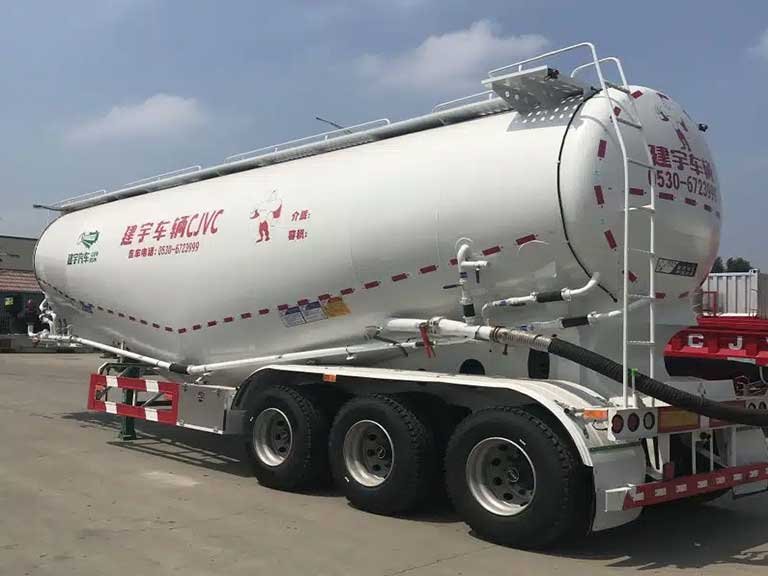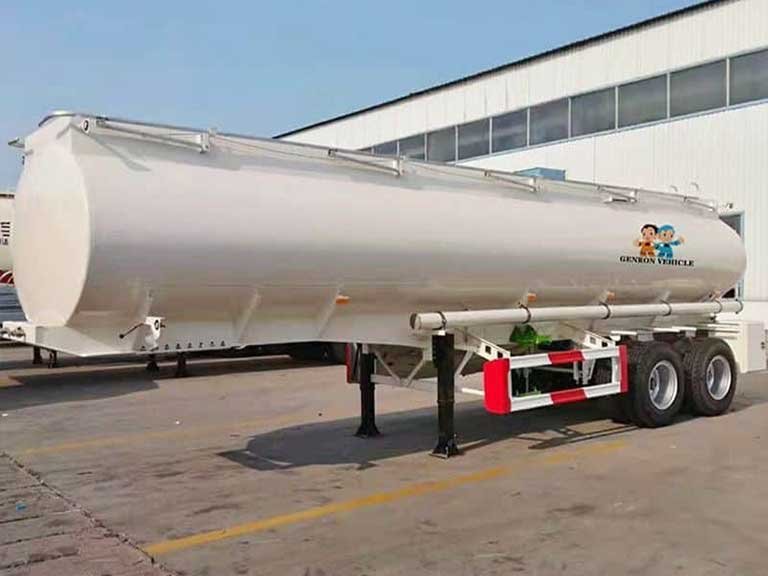Fuel tank trailer is an essential piece of transportation equipment for contemporary manufacturing. It allows for specialized transportation of chemicals, fuel oil, liquefied natural gas, and food-grade liquids. It is worth noting, however, that not all tanker trucks are created equal. Depending on the transportation needs, the structure of a tanker trailer may vary somewhat.
By using different types of tank trailers. Transportation companies are able to meet the complex transportation needs of different liquid cargoes. They will also adhere to strict industry standards and regulations to ensure safe and efficient operations.
In this article, Genron will provide a detailed overview of the various types of tank trailers, including their features, design, application scenarios and industry applications. We will also provide tips on choosing the right type of trailer. This will help you make a better decision.
Table of Contents
Different Types of Tanker Trailers
There are various types of tanker trailers, and each type is used in different directions. Below is a compilation of some of the common types of tanker trailers that we have put together:
Fuel and Crude Oil Transportation Trailers
These types of trailers are usually used to transport oil and its derivatives efficiently and safely. The hazardous nature of this task is why these trailers are usually equipped with multiple compartments, ranging from 1-6 in number and from 3,000 gallons to 8,000 gallons in capacity. These compartments are designed to prevent liquids from sloshing around during transportation and enhance transportation safety. At the same time, the compartments are designed to accommodate the transportation of multiple materials at the same time.
In the petroleum industry, these trailers are currently being used to transport the following products:
- Gasoline
- Diesel
- Ethanol
- Jet fuel
Transporting petroleum is extremely dangerous and therefore your tanker must comply with international and national transportation regulations. If you are looking to buy an oil tanker trailer, then Genron will provide you with a professional and compliant crude oil tanker trailer.
Begin with a bespoke semi-trailer designed for your exact needs. Whether it’s heavy-duty hauling or specialized cargo, we’ve got the perfect solution to keep you moving forward.
LPG, LNG, and Natural Gas Transportation Trailers
These trailers are usually specially designed for the efficient transportation of LPG, LNG and CNG. These gases are often produced for heating and powering automobiles and industries, and LPG, LNG, and natural gas transportation trailers are well suited to enhance a pressure-resistant and low-temperature environment to ensure safe transportation.
Transportation of these gases requires adherence to strict safety standards. They are equipped with pressure relief valves and high-pressure vessels to prevent accidents. At the same time, the special double-walled tank design improves insulation and reduces losses. Capacities typically range from 8,000 to 12,000 gallons.
Chemical Transportation Trailers
Chemical transport trailers are designed for the transportation of corrosive or toxic chemicals. The standard capacity of these trailers typically ranges from approximately 3,800 – 11,000 gallons. To ensure safety during transportation, these trailers utilize corrosion resistant materials such as polymer coatings and high-grade stainless steel.
The use of these materials prevents chemical reactions between the chemicals and the tank, which can lead to corrosion or structural damage. Leakage of chemicals into the external environment is also avoided.
In addition, chemical transportation trailers are equipped with a safety exhaust system. This system automatically regulates the pressure inside the tank to minimize the risk of leakage due to pressure changes. The exhaust system is also equipped with an explosion-proof and sealed design to prevent the leakage of toxic or flammable gases.
Food Grade Liquid Transportation Trailers
These trailers have high health and safety requirements. Trailers are usually made of food-grade stainless steel with a polished interior. This prevents the accumulation of residues and the growth of bacteria. It also reduces the adhesion of liquids and facilitates cleaning and maintenance.
The trailers are constructed using seamless welding technology, which reduces the risk of bacterial growth at welded seams and meets strict hygiene standards. They are often used for the transportation of
- Liquid dairy products
- Fruit juices
- Alcohol
- Vegetable oils
- Vinegar
- Corn syrup
- Sugar alcohols
- Milk

Asphalt Tankers
Asphalt tank trucks are designed to transport hot liquid asphalt. These tankers need to keep the tank heated at all times to ensure that the asphalt does not solidify during transportation. For this specific need, they are usually equipped with insulation and heating devices to keep the temperature in a constant range. They allow the asphalt to remain fluid enough during loading and unloading.
At the same time, the inside of the tank is usually coated with a special anti-adhesion coating, which reduces the amount of asphalt left behind after unloading.
Due to this outstanding performance, asphalt tankers are now widely used by construction companies and road construction enterprises. They play an important role in the asphalt transportation process.
Vacuum Trailer
The vacuum trailer is equipped with a built-in powerful vacuum pump for efficient absorption and transportation of liquid waste, slurry and sewage. Its tank has a gas-tight structure to prevent leakage and odor spreading, ensuring safe transportation. It is commonly used for applications such as industrial cleaning, sewage treatment at construction sites, environmental protection programs, and sewer dredging. These trailers are also equipped with venting and pressurization systems for fast unloading and improved efficiency.
Dry Bulk Tank Trailer
The Dry Bulk Tank Trailer is a specially designed trailer type. It is specially designed for the transportation of powdery or granular materials such as cement, lime, flour, etc. The tank structure of this type of trailer has good sealing and durability, which ensures moisture and leakage problems during the transportation of materials. Also, according to the loading and unloading requirements, these trailers are equipped with an inflatable unloading system to meet the rapid unloading requirements. It is an ideal bulk material transportation solution for construction sites, manufacturing and agriculture.

Design Features of Tank Trailers
Tank trailers are designed to focus on safety and transportation efficiency. Different types of these design structures meet the needs of different liquid transportation. The main types of design include baffle type design, bulkhead type design and smoothbore type design.
Baffle type: Transverse baffles are set inside the tank to reduce the liquid shaking while traveling. This design improves the stability of the vehicle. In particular, it reduces the risk of rollover during cornering and braking.
Bulkhead: The tank is separated into chambers by installing multiple longitudinal bulkheads inside the tank. This design is suitable for transporting many different liquids or spreading the weight of liquids. It also reduces shock and improves driving stability.
Smoothbore: Without any internal structure, the liquid can flow freely during transportation. This type of design is suitable for transporting liquids with high stability. It is also easier to clean and maintain. However, care needs to be taken during operation to prevent the liquid from shaking and causing instability.
Choosing the Right Tank Trailer
Choosing the right tank trailer is a critical step in ensuring safe and efficient transportation. Here are the main factors to consider in the selection process:
Selection based on cargo type: Different types of liquids, such as fuels, chemicals or food-grade liquids. You will need to choose trailers of different designs and materials. Ensure that the trailer material is compatible with the cargo characteristics to avoid reaction or corrosion.
Tank capacity: Choose a tank capacity that suits the transportation volume requirements to avoid unnecessary extra costs and road restrictions.
Consider transportation distance and environment: Long-distance transportation requires the selection of a trailer design with high stability and reliability, especially with bulkheads or baffles to minimize liquid sloshing. In addition, consider the impact of climatic conditions, such as hot or cold environments, on the trailer.
Industry regulations and standards: Ensure that the trailer complies with relevant transportation regulations, such as DOT (U.S. Department of Transportation), ADR (International Agreement on the Transportation of Dangerous Goods), and others. Transportation of food-grade liquids should follow FDA or equivalent international food safety standards.

Conclusion
The tanker truck serves as an important trailer type. Its applications cover a diverse range of transportation needs from fuel to food. Different design types and material options also ensure safe and efficient transportation. That’s why it’s important to understand the different types of tanker trucks. This will not only help you optimize your operations, but also ensure compliance and college transportation.
In this article, we’ve explored just some of the common types of tanker trucks. If you don’t find the type of trailer you’re looking for, consult with our team of professionals. As a professional tanker manufacturer, we can customize on demand while meeting local laws and regulations. Ensure your transportation is safe and smooth.
FAQ
What is a fuel tank trailer?
Specialized trailers for transporting a variety of liquids (e.g., fuels, chemicals, food-grade liquids) that are designed to be leak-proof and meet transportation safety standards.
What is the difference between LNG and LPG transportation trailers?
LNG trailers require cryogenic insulation systems to maintain extremely low temperatures, while LPG trailers focus on high pressure storage for different liquefaction conditions.
How are tank trailers loaded and unloaded?
Pumps and piping systems are used to ensure flow control. Grounding, anti-static and personal protective equipment (PPE) are required.
How are tank trailers maintained?
Regularly clean and inspect seals and valves to ensure there are no leaks, and conduct annual safety inspections.
What safety measures are required when operating a tank trailer?
Ensure grounding, operate explosion-proof equipment, stay away from sources of ignition, and have an emergency plan, such as fire or spill handling.


